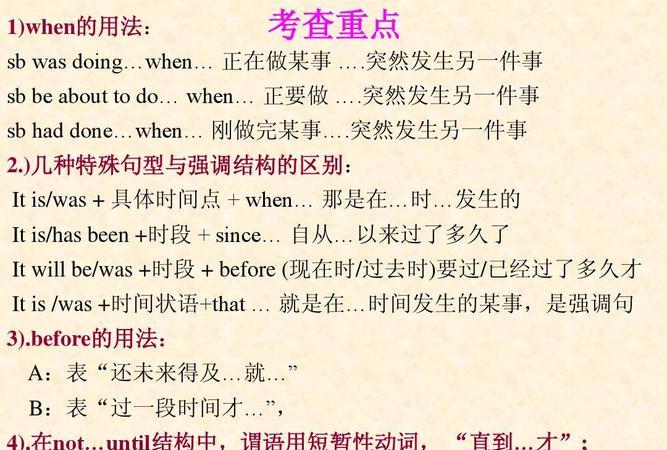动词状语从句作为主句的修饰语,通过连词引导,表达时间、条件、原因、目的和结果等语义关系。时间状语从句描述动作发生的时间,条件状语从句描述动作发生的条件,原因状语从句描述动作发生的原因,目的状语从句描述动作的目的,结果状语从句描述动作的结果。掌握动词状语从句的使用能让语言表达更准确、生动、流畅。

时间状语从句
时间状语从句是最常用的动词状语从句之一,它表示主句中的动作发生的时间。常用的连词有when, while, as, before, after, since等。例如:
- I'll call you when I arrive in Beijing. (我到北京后会给你打电话。)
- While I was reading, he was watching TV. (我在看书的时候,他在看电视。)
条件状语从句
条件状语从句表达的是主句动作发生的条件。常用的连词有if, unless, provided that等。例如:
- If it rains tomorrow, we will stay at home. (如果明天下雨,我们会呆在家里。)
- Provided that you finish your homework, you can go out to play. (只要你完成作业,就可以出去玩了。)
原因状语从句
原因状语从句表达的是主句发生的原因。常用的连词有because, since, as等。例如:
- Because he was sick, he didn't go to work. (因为他生病了,所以没去上班。)
- As I was tired, I went to bed early. (因为我很累,所以早早就睡了。)
目的状语从句
目的状语从句表达的是主句中的动作或状态的目的。常用的连词有in order that, so that等。例如:
- I bought a new dress in order that I could wear it to the party. (我买了一件新裙子,为的是能穿着它去参加派对。)
- She speaks slowly so that everyone can understand her. (她说话很慢,以便每个人都能听懂。)
结果状语从句
结果状语从句表达的是主句中的动作或状态所产生的结果。常用的连词有so that, such that, that等。例如:
- He was so tired that he fell asleep immediately. (他太累了,以至于马上就睡着了。)
- The weather was so bad that we had to cancel the picnic. (天气太糟糕了,我们不得不取消野餐计划。)
